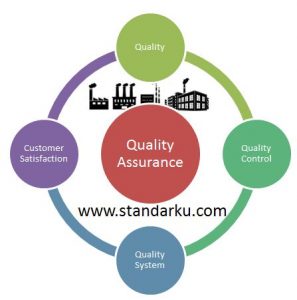
Background of why should we complies to Quality
For the last of 20 until 30 years, businesses have focused on quality.
As markets have become much more competitive – quality has become widely regarded as a key ingredient for success in business.
Today’s business climate requires an exact interpretation of customer requirements coupled with effective and efficient processes to meet those requirements.
Definition of Quality
Product or service quality is “complies with requirement, freedom from defects or contamination, or simply a degree of customer satisfaction.”
To reach the definition of “Quality”, some concepts may be understood :
Meeting requirements : Specifications are an imprecise means of conveying subjective aspects.
Conformance to requirements is not necessarily all there is to achieving quality.
Quality is the result of a comparison between what was required and what was provided. It is judged not by the producer but by the receiver.
The only true measure of acceptable quality is customer satisfaction, which takes into account both objective and subjective interpretations of the needs and expectations of customers.
Customer needs and expectations are constantly changing. Awareness of new technology, legislation, problems, competitor products or services creates new wants for customers.
Quality has many meanings as follow :
- a degree of excellence,
- conformance with requirements,
- the totality of characteristics of an entity that bear on its ability to satisfy stated or implied needs,
- fitness for use,
- freedom from defects, imperfections or contamination
- delighting customers.
Quality is about:
- A standard which can be accepted by both the supplier and the customer.
- Giving complete satisfaction to the customer;
- Complying consistently to an agreed level of specification;
- Providing an acceptable product at an acceptable cost;
- Providing a product which is ‘fit for the purpose’;
- The totality of features or characteristics of a product that bear on its ability to satisfy a given need.
All about Quality
Quality is not about:
- Complying with a specification
- Being the best
- Only producing a product that is ‘fit for the purpose
But, Quality is all about : Customer Satisfaction
Quality Control
What is Quality Control ‘QC’?
Is a set of measures taken to ensure that defective products or services are not produced.
And that the design meets performance requirements.
What is detection?
It is about getting rid of the bad things after they have taken place.
Quality Assurance
“Assurance” means “Freedom from doubt”
Defining “Quality Assurance Systems”
Prevention-based systems which improve product and service quality.
And increases productivity by placing the emphasis on product, service and process design.
The purpose of QA is:
To provide assurance to a customer
To ensure that manufacturing and/or service standards are uniform
QA is concerned with:
- An agreed level of quality.
- A commitment within an organization to the fundamental principle of consistently supplying the right quality product, from a customer to the fundamental principle of only accepting the right quality product.
- A commitment to the basic principles of QA and QC.
Quality Management Systems
Definition of QMS :
- QMS is a proven technique to guarantee survival in world class competition, only by changing the actions of management will the culture.
- QMS is the art managing the whole to achieve excellence.
- QM requires a cultural change. This change is substantial and will not be accomplished in short period of time.
Requirements of a Quality Management System
To be successful, an organization must:
- Be able to offer products that satisfy a customer’s expectations;
- Agree with the relevant standards and specifications of a contract;
- Be available at competitive prices;
- Be able to supply products or services at a cost, that will still bring a profit to that organization.
Importance of “Quality”
Why should an organization be interested in quality?
A business would have no profits if it failed to create and retain satisfied customers.
Therefore, quality is vital to the survival of every enterprise.
What does quality apply to?
Quality applies to :
- every product
- service
- process
- task
- action
- decision
Those things can either be acceptable or unacceptable.
Hence, there is an intrinsic quality in everything that an organization does.
Who is responsible for quality?
Assigning responsibility means:
Giving a person the right to cause things to happen and with this right should be delegated the authority to control the processes.
It processes which deliver the output the quality of which the person is responsible for.